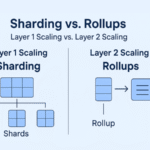Introduction to Smart Contracts
Smart contracts are self-executing programs stored on blockchain networks that automatically enforce agreements when predefined conditions are met. First proposed by Nick Szabo in 1994, they became practical with the emergence of Ethereum in 2015.
Key Characteristics:
✔ Autonomous – Execute automatically without intermediaries
✔ Immutable – Cannot be changed after deployment
✔ Transparent – Code is publicly verifiable
✔ Deterministic – Same inputs always produce same outputs
How Smart Contracts Work
Technical Architecture
- Code – Written in languages like Solidity or Vyper
- Compilation – Converted to bytecode for blockchain execution
- Deployment – Stored on-chain at a specific address
- Execution – Runs on blockchain virtual machines (EVM, WASM)
Transaction Flow:
- User initiates transaction
- Network nodes validate
- Smart contract executes
- Results recorded on blockchain
Development Ecosystem
Programming Languages
| Language | Blockchain | Features |
|---|---|---|
| Solidity | Ethereum | Most popular, JavaScript-like |
| Vyper | Ethereum | Python-like, security-focused |
| Rust | Solana, Polkadot | High-performance |
| Move | Aptos, Sui | Resource-oriented |
Essential Tools
- Remix IDE – Browser-based development environment
- Hardhat – Ethereum development framework
- Truffle Suite – Testing and deployment tools
- Foundry – Fast Rust-based toolkit
Writing Your First Smart Contract
Simple Storage Contract Example (Solidity)
solidity
// SPDX-License-Identifier: MIT
pragma solidity ^0.8.0;
contract SimpleStorage {
uint256 storedData;
function set(uint256 x) public {
storedData = x;
}
function get() public view returns (uint256) {
return storedData;
}
}
Development Process
- Setup Environment – Install Node.js, VS Code
- Write Contract – Create .sol file
- Compile – Use solc or Hardhat
- Test – Write unit tests
- Deploy – Use Remix or command line
- Interact – Call functions via web3.js
Security Considerations
Common Vulnerabilities
- Reentrancy attacks
- Integer overflows
- Unchecked external calls
- Front-running
Best Practices
- Use OpenZeppelin libraries
- Implement proper access control
- Conduct thorough testing
- Get professional audits
Real-World Applications
Industry Use Cases
- DeFi – Lending protocols, DEXs
- NFTs – Digital ownership
- Supply Chain – Product tracking
- Gaming – In-game assets
- Identity – Digital credentials
Learning Resources
- CryptoZombies (Interactive tutorials)
- Ethereum Documentation
- Solidity by Example
- Chainlink Hackathons
Conclusion
Smart contract development represents a paradigm shift in how we build applications. By mastering these skills, developers can create:
- Trustless applications
- Censorship-resistant systems
- Innovative financial products
Ready to start building? Begin with simple contracts and gradually tackle more complex projects as you gain experience.

